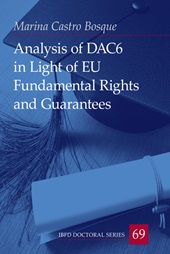Analysis of DAC6 in light of EU Fundamental Rights and Guarantees
Includes bibliographical references.
Since its adoption in 2018, an intense debate has arisen among academics at the international level on whether Council Directive (EU) 2018/822 of 25 May 2018 amending Directive 2011/16/EU as regards mandatory automatic exchange of information in the field of taxation in relation to reportable cross-border arrangements (DAC6) is sufficiently protective from a taxpayers' rights point of view. That is, opinions differ on whether the measure respects the most basic tenets of EU law: the fundamental rights and general principles of the European Union. Under the domain of EU law, measures that do not respect the general principles or fundamental rights are not considered proportional to the objective they are intended to achieve.
The same holds true in relation to measures affecting direct taxation. Further, in this regard, not only Member States but also EU legislators must respect all treaty provisions. Against this background, Recital 18 to DAC6 points out that this Directive respects the fundamental rights and observes the principles recognised in particular by the Charter of Fundamental Rights of the European Union. However, is this statement true in practice? This analysis necessarily involves assessing whether DAC6 as a piece of secondary legislation respects the requirements of EU primary law.
This is therefore the research question of this book: is DAC6 compliant with the requirements of EU primary law concerning fundamental rights and guarantees? The analysis focuses on whether the Directive respects certain specific rights and guarantees: inter alia, the principle of legal certainty, the rights of defence (in particular, professional secrecy and the right not to incriminate oneself), the right to privacy, the principles of proportionality and legality in their punitive demand, and the principle of culpability. [Publisher's text]
Revised thesis.
Special access authorizations may apply; please contact us for further information.
1904684 characters
-
Information
ISBN: 9789087228712
SERIES
DISCIPLINES



 EPUB
EPUB